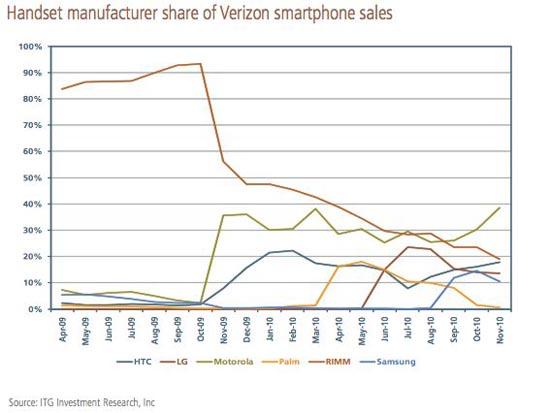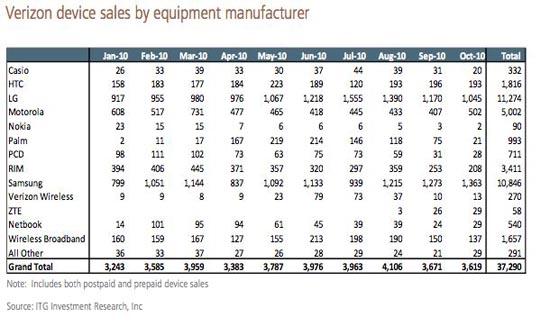
Ever since Verizon released the Motorola DROID way back in November, Big Red has been pushing out new Android devices and even taking credit for the platform's success. But what kind of impact has Android's popularity had on the BlackBerrys released on Big Red? As it turns out, it's been pretty big. The chart above was put together by ITG Investment Research and shows that at its peak in October 2009, the Verizon BlackBerry accounted for around 92 or 93 percent of all smartphones being sold on the carrier. The next month, though, the DROID made its presence known and BlackBerry sales dropped to around 56 percent. Last month, ITG reports that sales of RIM's handsets on Verizon are just below 20 percent of all smartphones sold on the carrier. That's a drop of 45 percent year-over-year in Q3 for RIM, with a 49 percent YOY drop expected in the fourth quarter. Meanwhile, 80 percent of Verizon smartphones sales in November 2010 belonged to Android, 46 percent of which were DROIDs.
This is pretty bad news for RIM, but it's not entirely surprising given: A) Android's all-around success and B) Verizon's getting behind Android like crazy, especially when it comes to marketing. It's not only Verizon BlackBerrys that have been feeling the hurt, though, as we've seen Android stealing more and more of RIM's market share as the year progressed. The Torch may be doing better lately than it did initially, but RIM is still slowly losing its luster to Android, iOS, and Windows Phone 7. While the PlayBook could help RIM a little, I haven't seen any upcoming devices that have the potential to reverse RIM's misfortune except for perhaps some QNX-powered smartphones, but it's unlikely that we'll be seeing those for a while. There's been a lot of news about what impact the Verizon iPhone will have on Android, but I've got a feeling that it's going to end up pouring some salt in RIM's Verizon market share wounds, too.

Via All Things D